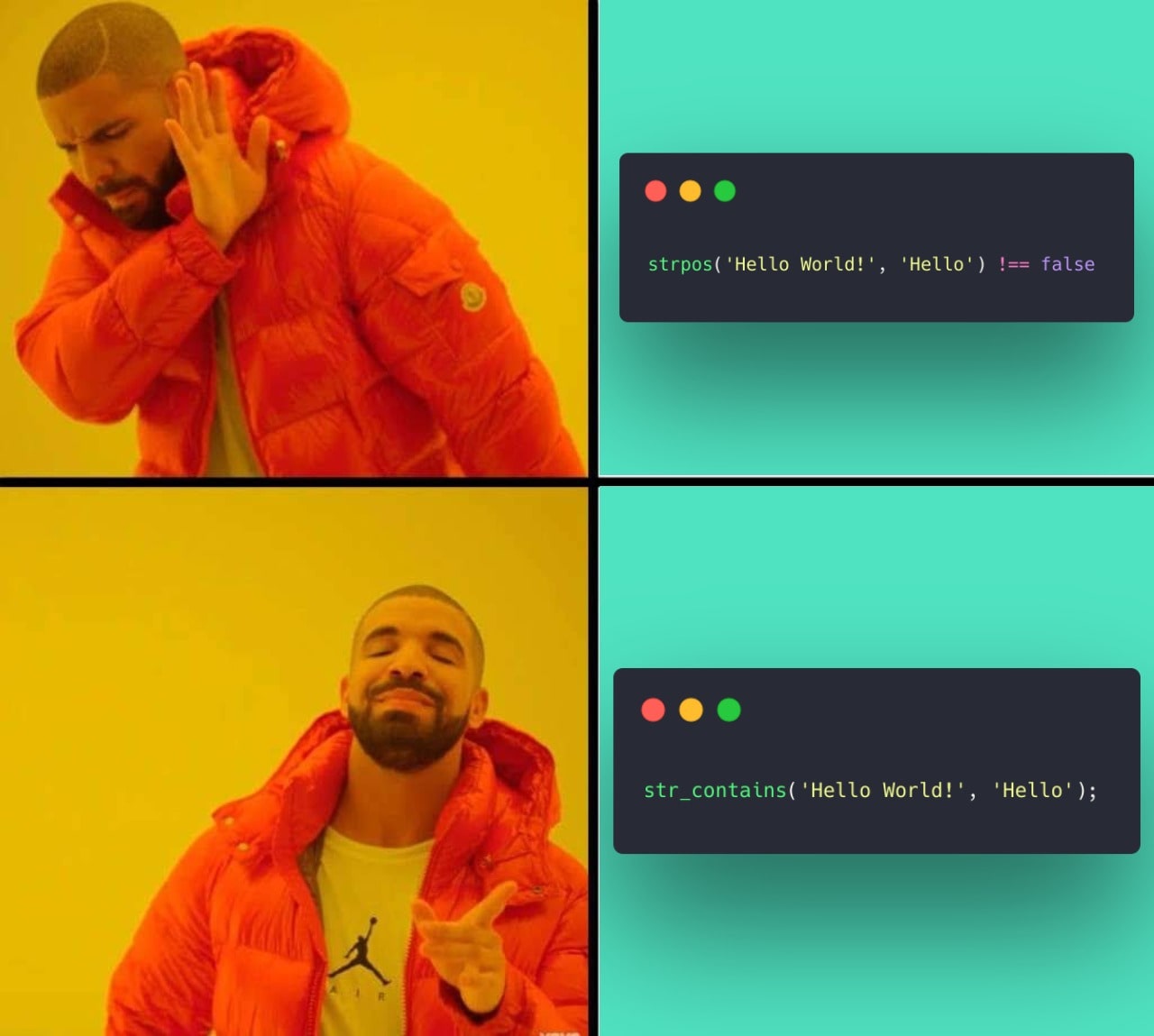These new string functions are coming in PHP 8
Who would’ve thought that PHP would have to wait till its version 8 or rather 25 years after its inception, to get a truly native and understandable function to check if a string is contained in another string?!
Well, PHP 8 will get shipped with three new such string functions which many of us were anticipating from very long. These functions are as below.
str_contains- The function checks if a string is contained in another string and returns a boolean value (true/false) whether or not the string was found.
str_contains ( string $haystack , string $needle ) : bool
str_starts_with- The function checks if a string begins with another string and returns a boolean value (true/false) whether it does.
str_starts_with ( string $haystack , string $needle ) : bool
str_ends_with- The function checks if a string ends with another string and returns a boolean value (true/false) whether it does.
str_ends_with ( string $haystack , string $needle ) : bool
Let’s go over them one by one.
TL;DR
The str_contains function
Prior to PHP 8 or up until now, the way that many of us used to check if the specified string is there within an another string or not was by using function strpos like so.
$a = 'How are you?';
if (strpos($a, 'are') !== false) {
echo 'true';
}
As you can see, this looks quite hacky, non-intuitive and hard to remember.
So, in order to fix this, this RFC attempts to add a new function called str_contains which checks if a string is contained in another string and returns a boolean value (true/false) whether or not the string was found. Here’s how its signature looks like.
str_contains ( string $haystack , string $needle ) : bool
So, str_contains takes a $haystack and a $needle as arguments, checks if $needle is found in $haystack and returns a boolean value (true/false) whether or not the $needle was found.

Here are few examples of the same.
str_contains("Hello World!", "Hello"); // true
str_contains("Hello World!", "Foo"); // false
// $needle is an empty string
str_contains("abc", ""); // true
str_contains("", ""); // true
It returns true when using empty string as needle because PHP compiler thinks that there’s an empty string contained in every string.
It’s also important to note here that str_contains is a case-sensitive function. So, the following will return false.
str_contains("Hello world!", "hello"); // false
str_starts_with and str_ends_with RFC
The str_starts_with() function checks if a string begins with another string and returns a boolean value (true/false) whether it does.
Once again, prior to this, the developers used to check this the same hacky way as we saw
in str_contains’s section which is non-intuitive.
Below is the function signature.
str_starts_with ( string $haystack , string $needle ) : bool
str_starts_with() checks if $haystack begins with $needle. If $needle is longer than $haystack, it returns false; else, it compares each character in $needle with the corresponding character in $haystack (aligning both strings at their start), returning false if it encounters a mismatch, and true otherwise. The function is also case-sensitive.
Here are few examples of the same.
$str = "beginningMiddleEnd";
if (str_starts_with($str, "beg")) echo "printed\n";
if (str_starts_with($str, "Beg")) echo "not printed\n";
// empty strings:
if (str_starts_with("a", "")) echo "printed\n";
if (str_starts_with("", "")) echo "printed\n";
if (str_starts_with("", "a")) echo "not printed\n";
Similarly, str_ends_with() does the same thing as str_starts_with() but aligning both strings at their end. Here’s its function signature.
str_ends_with ( string $haystack , string $needle ) : bool
And here are few examples of this function.
$str = "beginningMiddleEnd";
if (str_ends_with($str, "End")) echo "printed\n";
if (str_ends_with($str, "end")) echo "not printed\n";
// empty strings:
if (str_ends_with("a", "")) echo "printed\n";
if (str_ends_with("", "")) echo "printed\n";
if (str_ends_with("", "a")) echo "not printed\n";
The behavior concerning empty strings is in accordance with what is described in str_contains section.
More in PHP 8
👋 Hi there! This is Amit, again. I write articles about all things web development. If you enjoy my work (the articles, the open-source projects, my general demeanour... anything really), consider leaving a tip & supporting the site. Your support is incredibly appreciated!



